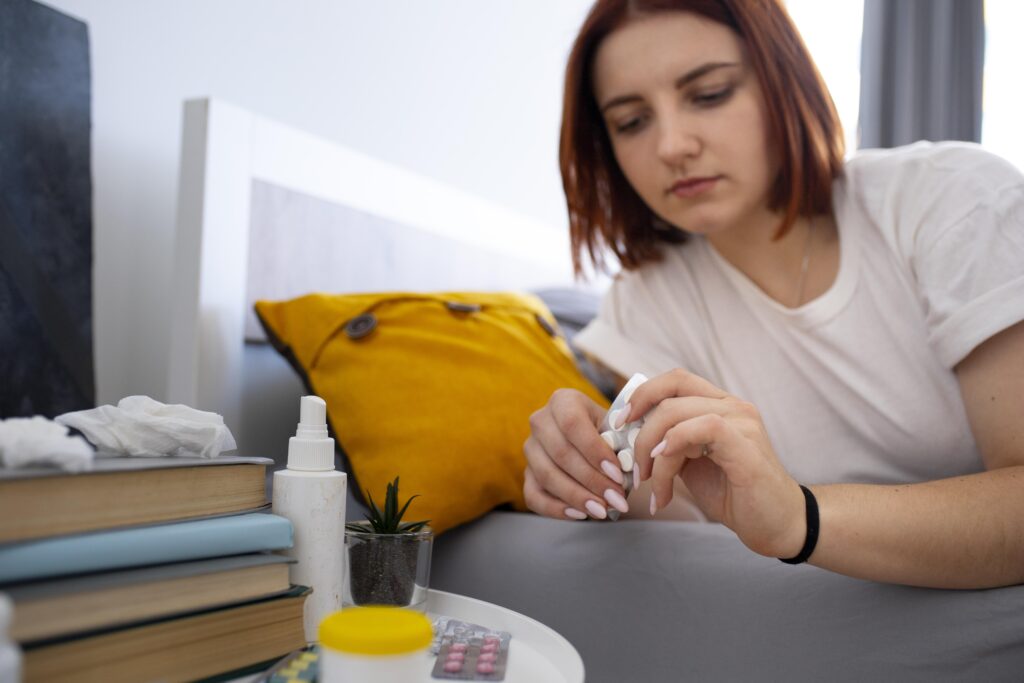Here we are going to share information on the topic “11 Things to Know About Using Birth Control and Antidepressants.” You’re not alone if you’ve never heard of the connection between hormonal birth control and antidepressants.
Continue reading to find out how they work together and how you can be impacted.

11 Things to Know About Using Birth Control and Antidepressants
1. Interactions
By speeding up the metabolism of progesterone and estrogen’s, some antidepressants, especially those that induce enzymes such as some SSRIs and SNRIs, may lessen the effectiveness of hormonal birth control techniques.
2. Effectiveness
Antidepressants do not function as a form of birth control. They are not a reliable method of birth control and do not prevent pregnancy.
3. Consultation
It’s important to see a doctor before beginning any new medicine, particularly if you take antidepressants or birth control already. Based on your medical history and the medications you are taking now, your doctor can offer you tailored counsel.
4. Side effects
Side effects are possible with both antidepressants and birth contraception. Contraceptives can induce headaches, nausea, and changes in menstrual flow, and antidepressants might lead to sleepiness, dizziness, or sexual dysfunction.
5. Hormonal Changes
The body’s hormone levels can be impacted by some antidepressants, especially those that lower serotonin levels. By changing the metabolism of contraceptive hormones, this may reduce the effectiveness of hormonal birth control techniques.
6. Choices
Condoms, diaphragms, and copper IUDs are examples of non-hormonal birth control that can be a good substitute if you use antidepressants and are worried about possible interactions with those pills.
7. Individual Response
Everybody reacts differently to drugs. While some people may not experience any negative effects or interactions between antidepressants and birth contraception, others may. It is crucial to keep an eye on your body’s reaction and talk to your healthcare professional about any worries you may have.
8. Effect on Mood
Hormone changes brought on by birth control or antidepressants may have an impact on mental health and mood. It’s critical to let your healthcare practitioner know about any changes in your mood or symptoms related to mental health.
9. Compliance
For birth control and antidepressants to work, it is essential that you take them as directed on a regular basis. The likelihood of an unplanned pregnancy or a worsening of depression symptoms may increase with missing doses or irregular use.
10. Modifications
If you encounter negative side effects or interactions between antidepressants and birth control, your doctor may need to change the amount of your prescription or move to an alternate method of birth control.
11. Effective management
Effective management of birth control and antidepressant use requires open communication between you and your healthcare practitioner. Talk about your worries, preferences, and experiences in a proactive manner to make sure your treatment plan is customised to meet your specific needs.
Which birth control techniques are we discussing?
Certain drugs used to treat depression may interfere with various hormonal contraception techniques. This comprises:
- Pill
- Patch
- Vaginal ring
- Implant
On the other hand, using a contraceptive shot or intrauterine device (IUD) doesn’t seem to have any effect.
Can one lessen the other’s effectiveness?
“The good news is that there are no known conflicts between various birth control methods and regularly prescribed antidepressants,” says Dr. Deborah Lee, an expert in sexual and reproductive health at Dr. Fox Online Doctor and Pharmacy.
“These antidepressants include serotonin-norepinephrine reuptake inhibitors (SNRIs), such as venlafaxine and duloxetine, and serotonin reuptake inhibitors (SSRIs), such as fluoxetine, citalopram, escitalopram, and sertraline.”
This implies that none of the antidepressants listed above should affect how well your birth control works.
- “Your liver enzymes break down and eliminate these compounds from your body every day when you take contraceptive hormones,” says Lee.
- “Drugs that increase the activity of liver enzymes, including St. John’s wort, lower the blood levels of contraceptive hormones by stimulating the liver enzymes.”
- “You may not be able to cease ovulating due to these low levels of progesterone and oestrogen, which increase the risk of an unintended pregnancy.”
IUDs and the shot are the only forms of contraception that are unaffected.
If you take St. John’s Wort, be aware that you will require non-hormonal birth control, like condoms, for 28 days following the remedy’s cessation.
On the other hand, the question of whether birth control can affect the efficacy of antidepressants is not well studied. The impact of taking reproductive hormones on SSRIs is complicated and poorly understood, as Lee puts it.
The use of hormonal contraceptives is not linked to any changes in the efficacy of SSRIs, according to the Centers for Disease Control and Prevention (CDC). The CDC does point out that there isn’t much data available right now.
Can they make each other’s side effects worse?
There shouldn’t be a difference in adverse effects for the antidepressants known as SSRIs and SNRIs, which don’t seem to interact with birth control.
However, when combined with hormonal contraceptives, TCAs and MAOIs may cause antidepressant side effects.
Menstrual abnormalities and irregular bleeding between periods are among the negative effects that might occur from using St. John’s Wort along with a contraceptive pill.
Again, there needs to be more research into why this may occur.
Exist any beneficial effects, or may one enhance the other?
- Surprisingly, there can also be advantages. However, there is contradicting data.
- According to a 2007 study, patients with major depressive disorder who took combination hormonal contraceptives reported far lower levels of depression than those who did not get any hormone treatment.
- Furthermore, according to Lee, there is no evidence linking the use of injectable contraceptives such as Depo Provera, patches, vaginal rings, implants, IUDs, and IUS to depressive symptoms.
- However, a 2019 analysis found that among individuals with a history of depressive episodes, hormonal contraception was likely to have unfavorable side effects related to mood.
This is another topic that needs more research.
Why was their relationship not mentioned to me earlier?
There are primarily two reasons: It’s not well researched, and it’s not often brought up in doctor’s visits.
Lee draws attention to a review that appeared in the American Journal of Obstetrics and Gynecology in 2015 on mental health and contraception.
According to her, the authors “call out that there are many research gaps and that, to yet, mental health hasn’t been given enough emphasis in the field of contraception.”
In 2016, one of the largest investigations into the relationship between depression and birth control was published. It discovered a link between a diagnosis of depression and all forms of hormonal contraception.
Why, therefore, aren’t there a lot more studies?
“Running mental health trials is related to specific concerns,” according to Lee. “The stigma that is still attached to receiving a mental health diagnosis makes it often difficult to recruit for the trials.”
Additionally, “research into women’s health has long been understudied and underfunded,” the speaker continues.
Depression “may be neglected or not even noticed in a crowded sexual health clinic,” which is not helping matters.
How can you tell if it will have a favorable or unfavorable outcome?
It’s difficult to say for sure because everyone has different hormone levels and body reactions.
Lee asserts, “It is impossible to forecast how you would feel on both.” “Try as the only way to find out.”
There are a few guidelines to follow, though.
- First and foremost, according to Lee, “it’s always necessary to examine carefully if using hormonal contraception and taking any routine medication at the same time is safe.”
- It is then advisable to introduce one new medication at a time. On the other hand, it can be challenging to identify which medication is causing adverse effects if you take two or more at once.
Typical adverse effects of contraceptives include:
- headache
- nausea
- discomfort in the chest
The side effects of antidepressants can vary. Among the adverse effects are:
- headache
- dizziness
- drowsiness
The majority of oral contraceptive pill adverse effects, according to Lee, “are modest and resolve within a few months after starting.”
Antidepressant side effects “may potentially get better with time.”
How can you assist in controlling this?
- It is best to see a physician or other healthcare provider before using birth control and antidepressants together.
- Talk to them honestly about all of your prescription drugs, any past mental health issues, and your present state of health.
- After that, they can advise you on the best antidepressant or method of birth control.
- Lee suggests starting a journal and recording your daily feelings, along with any new symptoms, as soon as you’ve started taking both types of medication.
- “This implies you have written documentation as evidence to present to the doctor” in the event that adverse effects manifest.
- They might talk about modifying techniques, adjusting dosages, and investigating non-pharmacological treatments.
Are there any other emotional or mental adverse effects to take into account?
Other than depression, both birth control and medications can have emotional negative effects. Try keeping a journal of your feelings, and if you’re worried, consult a physician.
They can advise you to switch to a new medicine or contraception that is less likely to have emotional side effects, or they might suggest adjusting your dosage.
Users of hormonal contraceptives saw increased rates of the following emotional impacts, according to a 2004 assessment of multiple studies:
- depression
- anxiety
- neurosis
- compulsion
- anger
The authors of the review pointed out that the paucity of data made it hard to determine whether hormonal birth control was the direct source of these effects.
On the other hand, a 2016 review discovered that the majority of users using combined methods—like the combined pill or patch—experienced either no effects at all or good outcomes connected to mood.
However, manufacturers of contraceptive pills and rings indicate mood swings as a possible side effect. Some antidepressant users have complained of feeling emotionally numb and having suicidal thoughts. In a 2014 study including over 1,800 antidepressant users, it was discovered that more than half of those aged 18 to 25 experienced suicide thoughts.
Furthermore, more than half of all participants reported feeling less like themselves, with 42% citing a “decrease in pleasant sensations.”
Would switching antidepressants or birth control work differently?
It may be beneficial to switch to a combination that is known to have no interactions.
Reliable Source in the event that you are prescribed TCAs, MAOIs, or St. John’s Wort, among other medications.
“I would propose switching the antidepressant if you’re extremely comfortable with your contraceptive, have been on it for a while, and truly don’t want to change it,” advises Lee. But it really depends on the circumstances and particular side effects that each person is dealing with.
Try switching to the non-hormonal copper IUD and continuing with your regular antidepressant to see if your symptoms improve if you’re curious as to whether your adverse effects are related to your antidepressant or contraception.
According to Lee, time is a tool. “You should wait approximately three months after switching to determine whether things are better or worse, as it often takes four to six weeks for medications and hormones to completely exit your system.”
Recall: Before quitting any form of contraception, consult a medical practitioner if you wish to avoid getting pregnant.

What happens if you wish to completely give up hormonal birth control?
Certain birth control methods, such as the pill, can be stopped immediately; however, in order to help forecast your next period and prevent irregular bleeding, it may be advisable to wait until the end of the pack or cycle.
Others, like the IUD and implant, can only be taken out by a physician or other medical expert.
The hormones typically exit your body in a few days. That implies that if you want to avoid getting pregnant, you should start using barrier methods like condoms or non-hormonal forms of contraception right away.
The birth control effects of the injection can linger for up to three months.
Regrettably, stopping birth control might have adverse repercussions for certain people. Menstrual fluctuations are typical and can manifest as lighter or heavier bleeding, spotting, and irregular periods.
It’s also possible for conditions like acne outbreaks that you had before using birth control to come back. Conversely, the unfavourable effects of your hormonal contraception should go away.
Speak with a healthcare provider for guidance if you’re having trouble adjusting to the changes or if you haven’t had a regular period in three months after stopping
Frequently Asked Questions
(11 Things to Know About Using Birth Control and Antidepressants)
Can I use antidepressants and birth control at the same time?
Answer: There isn’t any solid scientific proof that antidepressant use can make birth control less effective or raise the risk of getting pregnant. Most of the time, using birth control pills with antidepressants won’t interact with them.
What are the contraceptive pill dos and don’ts?
Answer: Steer clear of these typical birth control errors.
- You don’t take the medication as directed.
- You take medication that may interfere with the way your cycle works.
- You lose your vaginal ring.
- Your diaphragm is not checked before usage.
- You use condoms that are broken or expired.
- You use a condom and an oil-based lubricant.
Do births and antidepressants interact?
Answer: There is proof that taking SSRIs early in pregnancy may raise your baby’s chance of heart abnormalities, spina bifida, or cleft lip by a small amount. higher chance of early birth and miscarriage. a little higher chance of blood loss following delivery.
Can I use birth control and anxiety medicine together?
Answer: Similar to antidepressants, there are no known interactions between anti-anxiety drugs like SSRIs and birth control pills. Anti-anxiety and antidepressant drugs might have initial adverse effects, such as headaches or mood swings, which is something that needs to be taken into account.
Can birth control reduce the effectiveness of antidepressants?
Answer: It’s possible for someone taking hormonal birth control and antidepressants to interact negatively, but thankfully, many antidepressants can be taken with birth control without negatively impacting the effectiveness of either drug.
To whom should birth control pills be avoided?
Answer: The combined hormone contraceptive pill is not recommended for women with endometrial cancer, cirrhosis, hepatocellular adenoma, malignant hepatoma, migraines with auras, hypertension (systolic blood pressure ≥140 mmHg or diastolic blood pressure ≥90 mmHg, according to the CDC), breast cancer, or known ischemic heart disease.
Conclusion
(11 Things to Know About Using Birth Control and Antidepressants)
In summary, it is critical for people managing their reproductive and mental health to comprehend how birth control and antidepressants interact. Knowledge about possible interactions, adverse effects, and efficacy can enable people to make well-informed healthcare decisions. It is imperative to seek assistance and monitoring from healthcare specialists to guarantee the safe and successful use of both medications. This will eventually promote holistic well-being and enable individuals to make educated decisions regarding their reproductive and mental health care.
So, this is how the topic “11 Things to Know About Using Birth Control and Antidepressants” has been addressed.
For more information related to these topics,
You may also visit our Instagram page by
Thank you!

